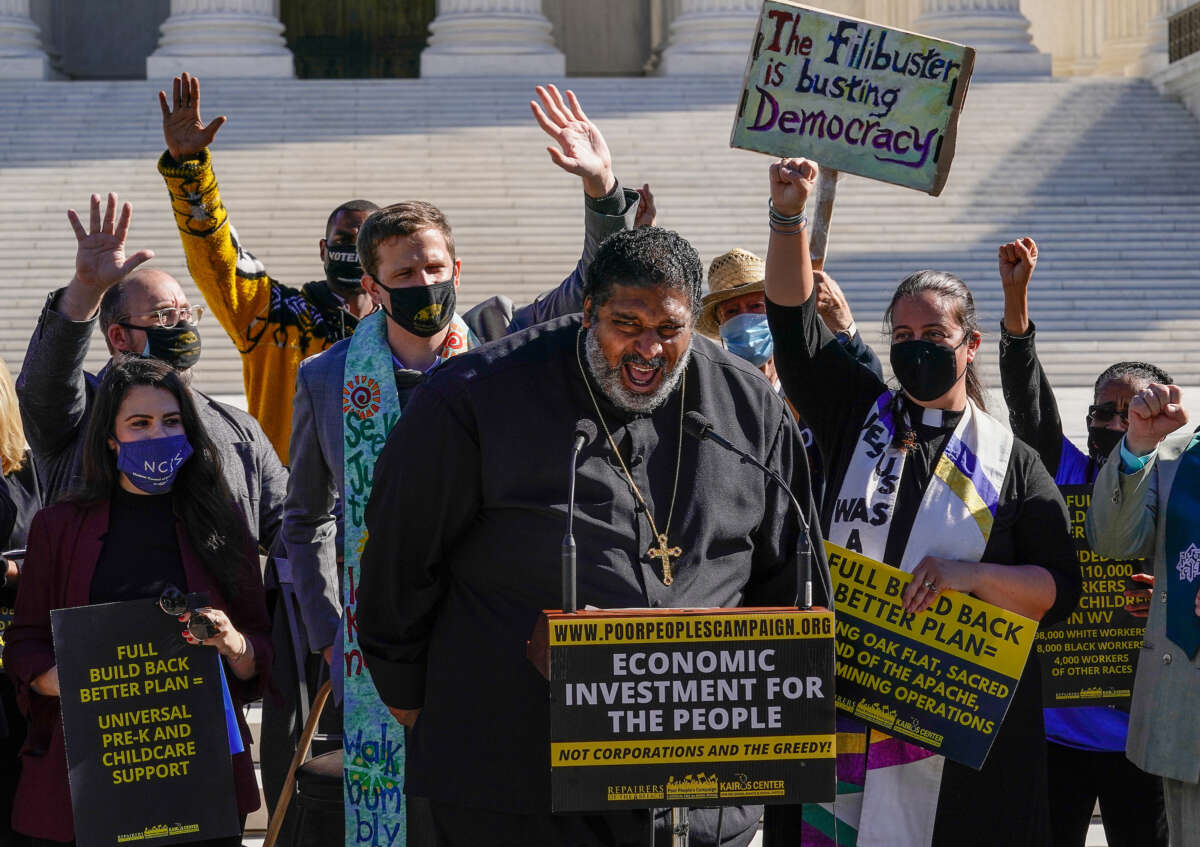Support justice-driven, accurate and transparent news — make a quick donation to Truthout today!
On the heels of launching an effort to raise the federal minimum wage to $17 an hour over five years, U.S. Sen. Bernie Sanders on Monday announced upcoming rallies to demand the pay hike in three states, where he will be joined by Bishop William Barber II.
Barber — Repairers of the Breach president, Poor People’s Campaign co-chair, and founding director of the Center for Public Theology and Public Policy at Yale Divinity School — plans to join Sanders (I-Vt.) to “make the moral case for raising wages.”
Sanders and Barber are first headed to Durham, North Carolina, where they are set to be joined by Democratic Durham County Commissioner Nida Allam — who worked for the senator’s 2016 presidential campaign — for a 7:00 pm ET rally at the Hayti Heritage Center on June 1.
The pair then plans to visit the Henderson A. Johnson Memorial Gymnasium at Fisk University in Nashville, Tennessee at 7:00 pm CT on June 2. State Rep. Justin Jones (D-52) — who gained national attention earlier this year for being expelled by GOP legislators over a protest demanding gun control, only to be promptly reinstated by Nashville’s Metropolitan Council — is expected to join them.
A third rally hosted by the International Longshoremen’s Association Local 1422 at their union hall in Charleston, South Carolina is scheduled for 4:00 pm ET on June 3. State Rep. Wendell Gilliard (D-111) plans to join the event, in partnership with the South Carolina AFL-CIO.
A longtime advocate of increasing the U.S. minimum wage, Sanders and labor leaders announced their push for $17 per hour earlier this month. Though several states have set higher minimums, the federal rate of $7.25 hasn’t changed since 2009.
“At a time of massive and growing income and wealth inequality and record-breaking corporate profits, we must stand up for working families — many of whom are struggling every day to provide a minimal standard of living for their families,” Sanders — who chairs the Senate Health, Education, Labor, and Pensions (HELP) Committee — said Monday.
“There are too many Americans trying to survive and raise families on $9, $10, or $12 an hour. It cannot be done. This injustice must end,” he added. “Low-income workers need a pay raise and the American people want them to get that raise.”
The progressive think tank Data for Progress last week released polling results that show 76% of likely voters across party lines would support a $17 hourly minimum wage — and 74% would support $20.
The survey, conducted in early May, also revealed that all likely voters believe Americans need to earn $26.20 per hour “to have a decent quality of life (that is, the ability to afford basic necessities such as groceries, rent or mortgage payments, transportation, and other essential bills without struggling).”
$26 per hour: The wage voters think you need to earn to have a decent quality of life in the U.S.
$7.25 per hour: The current federal minimum wage. https://t.co/OtkYnMcP7N
— abby springs (@abby_springs) May 24, 2023
Plans for the rally series come after researchers at the University of California, Berkeley kicked off May by putting out a working paper that shows significant minimum wage increases can have positive effects on earnings and employment — countering claims from corporate lobbying groups that oppose such pay hikes.
While Sanders has the power to ensure his panel takes up the issue, legislation to increase the minimum wage nationwide is unlikely to reach President Joe Biden’s desk, given the Republican-controlled House of Representatives and a Senate that still includes Democrats who partnered with the GOP in 2021 to block a measure that would have mandated a $15 hourly rate.
Media that fights fascism
Truthout is funded almost entirely by readers — that’s why we can speak truth to power and cut against the mainstream narrative. But independent journalists at Truthout face mounting political repression under Trump.
We rely on your support to survive McCarthyist censorship. Please make a tax-deductible one-time or monthly donation.
